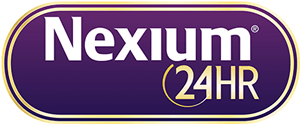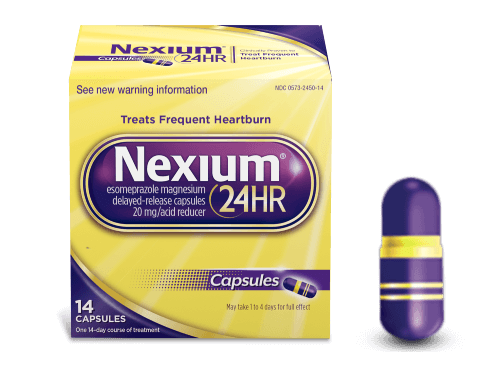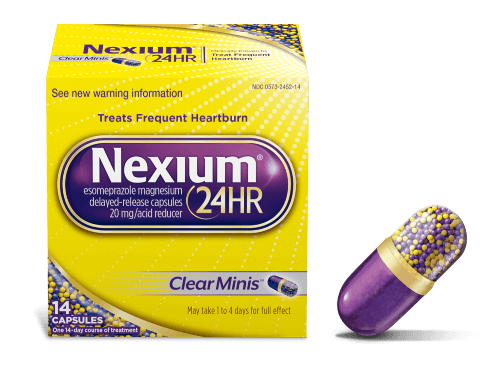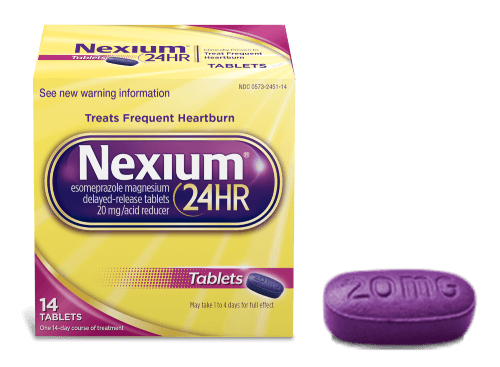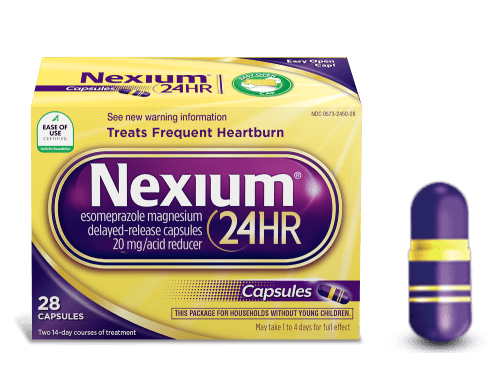Proton pump inhibitors, or PPIs for short, are a common medication used to relieve frequent heartburn, or heartburn that occurs two or more times a week. They work by blocking the production of stomach acid at the source, which prevents acid from reaching your esophagus and causing heartburn.1 If you suffer from frequent heartburn, learn the mechanisms behind the PPI and how it can help relieve your symptoms.
What Is a Proton Pump Inhibitor?
The stomach contains special cells known as parietal cells, which play an important role in producing stomach acid. These cells contain tiny molecular pumps called proton pumps that release acid into your stomach. Proton pump inhibitors are medications that prevent the cells in your stomach from producing gastric acid by switching them off.2
What Causes Heartburn?
Your stomach has a thick mucus lining that protects it from stomach acid and other irritating substances. However, unlike your stomach, the esophagus doesn’t have a lining and is easily irritated by stomach acid. When you’re suffering from frequent heartburn, stomach acid is what’s irritating the lining of your esophagus and causing your symptoms.3
To stop stomach acid from escaping, your lower esophagus is attached to a valve that prevents stomach acid from flowing upwards and causing heartburn. Unfortunately, when that valve is weakened, due to a variety of different reasons, stomach acid can enter the esophagus and throat, causing heartburn symptoms.4 PPIs reduce heartburn by decreasing the amount of acid in the stomach so that there’s less acid to overflow into the esophagus.2
The Proton Pump Inhibitor Mechanism of Action
PPIs work by targeting and inhibiting proton pumps. Here's a simplified breakdown of the process:2,5
- Ingestion: After you take a PPI pill as directed, it travels down your esophagus and reaches your stomach.
- Absorption: Once inside your stomach, the PPI is absorbed into your bloodstream.
- Circulation: The bloodstream carries the PPI to the tiny proton pumps in your stomach lining.
- Proton pump inhibition: These PPIs bind to the proton pumps in your stomach, effectively shutting them down. When these pumps are inhibited, they can't release as much gastric acid into the stomach.
- Reduced acid production: With the proton pumps unable to function at their full capacity, the production of stomach acid decreases significantly.
- Relief: As a result, the reduced acid production provides relief from heartburn and prevents excessive acid from flowing into the esophagus.
Do Proton Pump Inhibitors Provide Reliable Heartburn Relief?
When used as directed, proton pump inhibitors can provide heartburn relief. In fact, proton pump inhibitors are the most effective way to treat frequent heartburn. They’re available in both over the counter and prescription strengths, and it's essential to follow the directions or your healthcare provider’s instructions for their proper use and duration.1
It's worth noting that long-term use of PPIs should be monitored by a healthcare professional, as they can be associated with certain side effects and potential risks. Therefore, have a conversation with your healthcare provider to determine the best treatment plan for your specific condition.1
What’s the Difference Between PPIs and Antacids?
While both antacids and proton pump inhibitors are used to manage heartburn symptoms, they work in fundamentally different ways. Antacids are fast-acting and provide temporary relief by neutralizing stomach acid using a blend of calcium and magnesium. They’re usually taken as needed to alleviate occasional heartburn or indigestion.6
Unlike antacids, PPIs work by reducing the production of stomach acid at the source. Instead of relieving occasional heartburn symptoms, PPIs are used to relieve symptoms of frequent heartburn, or heartburn that occurs at least twice a week. Antacids offer rapid but short-term relief, while PPIs are designed to be taken for two weeks.2,6
Is Nexium 24HR a Proton Pump Inhibitor?
Proton pump inhibitors are powerful medications that effectively alleviate symptoms of frequent heartburn. Their mechanism of action lies in their ability to inhibit proton pumps within the stomach lining, reducing the production of stomach acid and providing much-needed relief at the source.2
Nexium 24HR’s active ingredient is esomeprazole, a type of proton pump inhibitor that’s available over the counter at a dose of 20 mg.2 Unlike antacids, which provide immediate relief, Nexium 24HR stops the production of acid before it starts for long-lasting relief. If you suffer from frequent heartburn, take control of your symptoms with Nexium 24HR. In addition, learn more about all things heartburn and acid reflux on our Understanding Heartburn article hub.
For more information around heartburn, check out Nexium 24HR on YouTube!
Source Citations:
1. Mayo Clinic Q and A: Proton pump inhibitors generally safe when used as directed - Mayo Clinic News Network. https://newsnetwork.mayoclinic.org/discussion/mayo-clinic-q-and-a-proton-pump-inhibitors-generally-safe-when-used-as-directed/. Accessed 10/2/23.
2. Proton pump inhibitors. MedlinePlus Medical Encyclopedia. https://medlineplus.gov/ency/patientinstructions/000381.htm. Accessed 10/2/23.
3. Gastroesophageal reflux disease (GERD) - Symptoms and causes. Mayo Clinic. https://www.mayoclinic.org/diseases-conditions/gerd/symptoms-causes/syc-20361940#. Accessed 10/2/23.
4. Heartburn: What It Feels Like, Causes & Treatment. Cleveland Clinic. https://my.clevelandclinic.org/health/diseases/9617-heartburn-overview. Accessed 10/2/23.
5. Pharmacology of Proton Pump Inhibitors. PMC. https://www.ncbi.nlm.nih.gov/pmc/articles/PMC2855237/. Accessed 10/9/23.
6. Antacids – StatPearls. NCBI Bookshelf. https://www.ncbi.nlm.nih.gov/books/NBK526049. Accessed 10/9/23.
